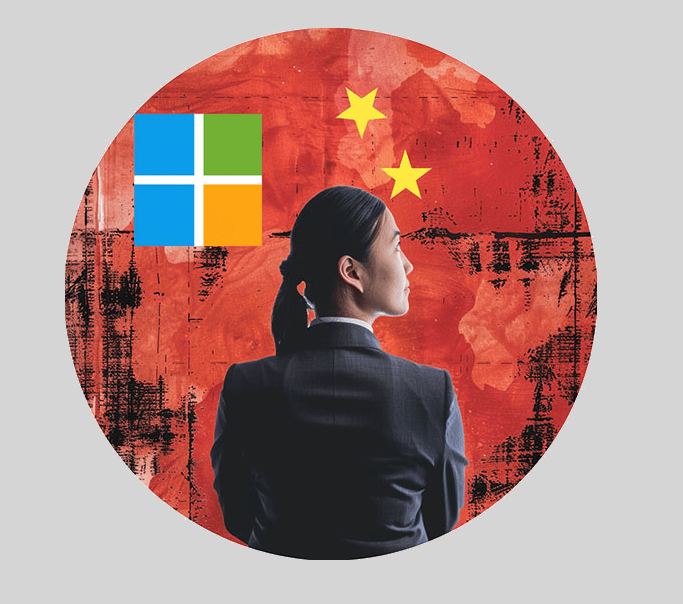Why is the Chinese state media reporting that Microsoft has asked at least 100 employees to consider relocating to other countries?

Why?
It’s been reported that Microsoft has asked hundreds of its China-based employees, particularly those involved in cloud computing and AI, to consider relocating to other countries. It’s thought that this decision was prompted by escalating tensions between the United States and China, e.g. over technological advancements and trade issues, such as AI and semiconductors. Differing reports put the number that have been given the option to relocate between approximately 100 and 800 employees (mainly Chinese nationals). It’s also been reported that the employees only have less than one month to decide.
However, Microsoft appears keen to emphasise that offering internal transfer opportunities to employees is part of its standard global business management practice and is a regular part of managing its global operations.
Why Is This Move Potentially Significant?
Bearing in mind the backdrop of increasing tensions between the United States and China, the relocation offers and the relatively short decision-making window for those affected could be seen by some as an indication that the company is planning to reduce its dependency on China. In doing so, it may be a way for Microsoft to mitigate the risks associated with geopolitical instability and trade conflicts, thereby helping it to maintain smooth operations and protect itself from any risks to its intellectual property, e.g. from potential regulatory challenges in China. Microsoft has reportedly said, however, that it remains committed to its presence in China
Where?
Reports indicate that Microsoft has suggested the United States, Ireland, Australia, and New Zealand as countries the employees have the option to re-locate to.
New Tariffs Announced
The trade conflicts and tech war between the US and China that may be behind Microsoft’s employee relocation ideas don’t look like lessening any time soon. For example, the Biden administration has just imposed tariffs on around $18 billion worth of Chinese imports, including electric vehicles (EVs) and various other products in a measure to shield US industries from being undercut by cheaper Chinese imports, which are often subsidised by the Chinese government.
Also, last October, the Biden administration restricted the sale of certain semiconductors to China to limit China’s access to advanced technology critical for both commercial and military applications, thereby maintaining the US’s technological superiority and addressing national security concerns.
These and other trade restrictions could all be viewed as part of the ongoing tech war between the US and China, characterised by escalating competition in high-tech sectors like AI, 5G, and semiconductor manufacturing with the US becoming increasingly wary of China’s rapid technological advancements and their implications for global power dynamics.
Cyber Attack Protection For UK Politicians
Meanwhile, 2024 is a major global election year for at least 64 countries including the US, UK, India, and South Africa. Here in the UK, this being the general election year, together with the threat of how AI (deepfakes) and email-based threats could be abused by adversaries, The National Cyber Security Centre (NCSC – part of the GCHQ) has announced that it’s to provide “Personal Internet Protection” to politicians and high-profile individuals at risk from attack. The Chinese State (the Chinese Communist Party) is very likely to be one of the key states that the UK’s NCSC is offering protection from, especially since back in March, a Chinese state hacking group targeted the email accounts of over 40 UK parliamentarians that had spoken out against China or were members of the Inter-Parliamentary Alliance on China (IPAC).
The type of protection to be offered as part of (opt-in) “Personal Internet Protection” will be alerting people if any malicious activity is detected on their email accounts or devices.
What Does This Mean For Your Business?
The decision by Microsoft to ask hundreds of its China-based employees, especially those in cloud computing and AI, to consider relocating to other countries is a notable development amidst rising US-China tensions. This move highlights the ongoing challenges multinational companies face in managing geopolitical risks. While Microsoft may frame these relocations as part of standard global business management, the context suggests a strategic shift aimed at reducing dependency on China and mitigating risks related to intellectual property and regulatory hurdles.
For UK businesses, the escalating trade and tech war between the US and China could have significant repercussions. Actions like the imposition of a new raft of tariffs on Chinese imports, restrictions on semiconductor sales to China, plus an economic decoupling between the US and China, are reshaping global supply chains and impacting multinational companies. For UK businesses, this decoupling could mean disruptions in supply chains and increased costs if they rely on components or products from China or the US. Also, as the tech war intensifies, UK companies may need to navigate a more fragmented global market, with different standards and regulations across regions.
The strategic shifts by companies like Microsoft, combined with the broader geopolitical landscape, underscore the need for UK businesses to diversify their supply chains and remain agile. Understanding and preparing for potential regulatory changes and trade barriers will be crucial. Additionally, businesses should monitor developments closely and consider the implications of these geopolitical tensions on their operations and strategic planning.
Broadly speaking, the US-China tech war and associated economic decoupling (of which Microsoft’s latest move may be a symptom) present both challenges and opportunities for UK businesses. By staying informed and proactive, UK businesses can better navigate this complex environment, ensuring resilience and competitiveness in an increasingly divided global economy.
As for UK politics, it remains to be seen how effective “Personal Internet Protection” will be against determined state-sponsored hackers with huge resources at their disposal, especially if it’s simply an opt-in protection scheme.
By Mike Knight
